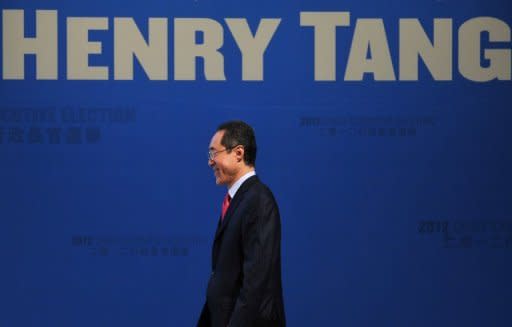HK leader candidate blames wife for 'underground palace'
China's reported favourite to become Hong Kong's next leader was under pressure to withdraw his candidacy on Friday after an illegal "underground palace" was found in his wife's home. But Henry Tang vowed to fight on despite the discovery of the unauthorised basement den, reportedly featuring a wine cellar, a Japanese-style bath, entertainment suite and a workout room at the upmarket property. The 59-year-old heir of a textile fortune said the illegal structure was his wife's idea, after media descended on the house and hired cranes to get a bird's-eye view of a glass-bottomed swimming pool above the basement. "I apologise to all Hong Kong people," an emotional Tang told a hastily convened press conference late Thursday. "It was my wife's idea and I knew they were illegal. Since we were experiencing a low ebb in our marriage...I did not handle the matter swiftly. I take full responsibility for the incident." The wine connoisseur however refused to quit the race, saying he should be judged by his business-friendly manifesto. Legal experts said he could face jail over the scandal, making him ineligible for office. "I believe that by being honest and open I can ask the public and the Election Committee members for a chance to show the people that I am the best candidate for the next CE (chief executive)," he told reporters on Friday. He also rejected media descriptions of the basement. "What I can say is there's no cinema, no Japanese-style bath. There's a punching bag, can you call it a gym? There's a room with a very big cabinet, can you call it a wine cellar?" he said. His comments -- taking responsibility while blaming his wife -- left many wondering if the man believed to be Beijing's favourite for the chief executive job has what it takes to lead the southern banking and trade centre. "Sells out wife for power," screamed the headline in the widely read Apple Daily. The anti-Beijing Chinese language newspaper said Tang's credibility had been "buried" in the "underground palace". The controversy is the latest setback for Tang's campaign, already beset by his frequent verbal gaffes and opinion polls putting him well behind his main rival, Leung Chun-ying. Tang has the support of the city's powerful business tycoons but his campaign got off to a shaky start late last year when he publicly admitted to cheating on his wife of 27 years, Lisa Kuo Yu-chin. A teary Kuo stood beside her husband then and again on Thursday as she admitted to arranging the excavations without Tang's knowledge. "I just wanted to plan a comfy place for my family," she said in response to a barrage of questions from journalists. "I'm very, very sorry." A 1,200-member Electoral Committee packed with pro-Beijing notables will choose the next chief executive on March 25, replacing incumbent Donald Tsang whose mandate is ending. Recalling Tang's earlier description of the den as a humble storage space, Chinese University of Hong Kong political scientist Ma Ngok said: "He has almost lost all his credibility ... he lied every day." "It appears that he's still trying to canvass Beijing's support, but based on his credibility it will be very difficult for him to lead Hong Kong for the next five years even if he is elected." Tang has not yet formally nominated himself for the chief executive job. The deadline is February 29. The central government has not publicly declared its preferred candidate but Tang is widely believed to be Beijing's man. Analysts said the basement fiasco left the central authorities in a difficult situation of possibly having to cast around for another candidate to back at the last minute. "Based on his conduct, his personality and his capability, he is not a suitable candidate for the next chief executive," said Regina Ip, chairwoman of the pro-Beijing New People's Party. The Buildings Department said the Tangs would be ordered to "rectify all the the illegal structures". If they failed to do so the structures would be demolished. Hong Kong is one of the most densely populated cities in the world and authorities regularly prosecute residents for making illegal additions to their homes and businesses.



